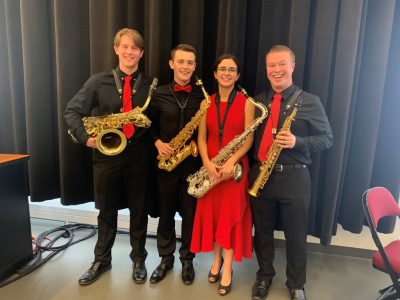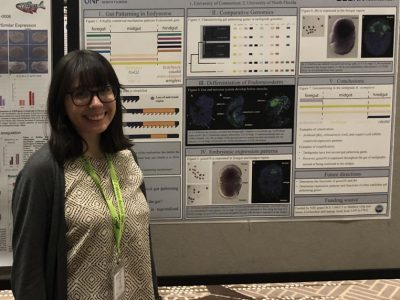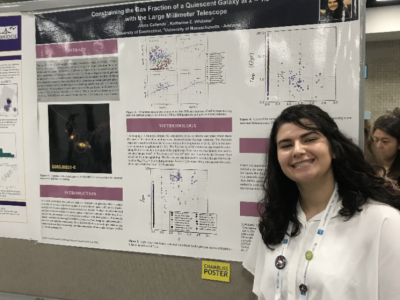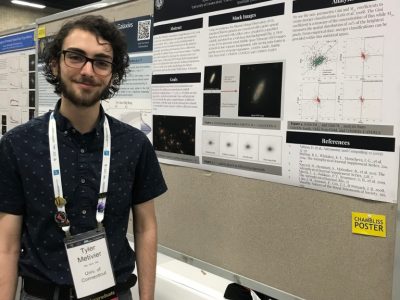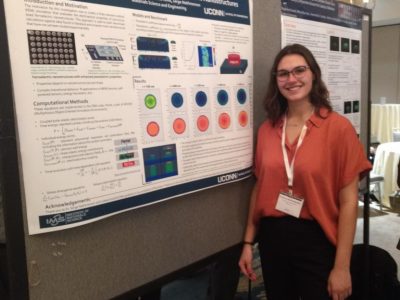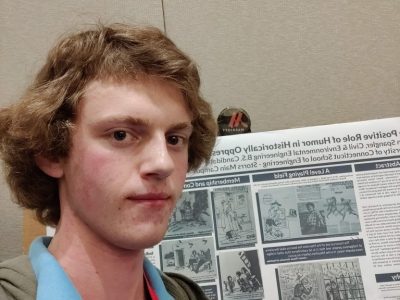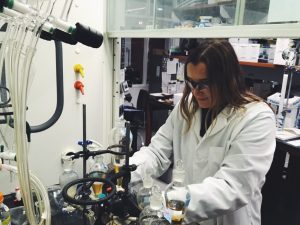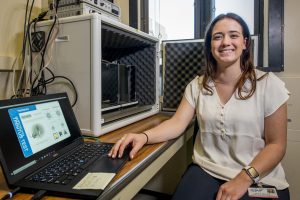
Please join us in congratulating the UConn undergraduates named below for their significant research and creative accomplishments in spring 2020. Students: if you have an accomplishment to share, please do so using this online form.
AWARDS
Congratulations to Christopher Choi ’20 (ENG, CLAS), Ariane Garrett ’20 (ENG), and Brittany Smith ’20 (ENG), the undergraduate recipients of 2020 NSF Graduate Research Fellowships! They are among the 12 UConn students and alumni who won NSF Graduate Research Fellowships this year.
Congratulations to Michael Hernández ’22 (CLAS), UConn’s newest Newman Civic Fellow. Michael is an Honors student at the Stamford campus majoring in Political Science and Economics. Michael has been active in pursuing social change through enacting innovative public policies such as the Afford to Dream Act which gives undocumented students access to financial aid at state colleges and universities.
PUBLICATIONS
Berk Alpay ’21 (ENG) is the lead author on publication based on his Holster Scholar research project:
Alpay, B.A., Wanik, D., Watson, P., Cerrai, D., Liang, G., & Anagnostou, E. (2020). Dynamic Modeling of Power Outages Caused by Thunderstorms. Forecasting, 2, 151-162, doi: 10.3390/forecast2020008
Ariane Garrett ’20 (ENG) is the lead author on a new publication from Dr. Kazunori Hoshino’s lab in Biomedical Engineering:
Garrett, A., Soler, G.J., Diluna, M.L, Grant, R.A., Zaveri, H.P., & Hoshino, K. (2020). A passive, biocompatible microfluidic flow sensor to assess flows in a cerebral spinal fluid shunt. Sensors and Actuators A: Physical doi: 10.1016/j.sna.2020.112110
SURF Award recipient Timothy Mason ’20 (CLAS) was a co-author on a recent publication from Dr. Barbara Mellone’s lab in Molecular and Cell Biology:
Palladino, J., Chavan, A., Sposato, A., Mason, T.D., & Mellone, B.G. (2020). Targeted de novo centromere formation in Drosophila reveals versatility and maintenance potential of CENP-A chromatin. Developmental Cell, 52, 379-394, doi: 10.1016/j.devcel.2020.01.005
EXHIBITIONS AND SCREENINGS
Spring 2020 included a series of scheduled art exhibitions and screenings by the following undergraduate students, some of which were canceled or delayed due to COVID-19:
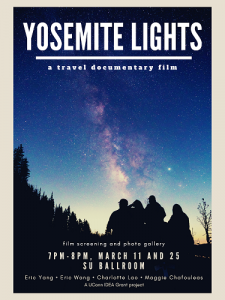 Maggie Chafouleas ’22 (CAHNR) – UConn IDEA Grant recipient
Maggie Chafouleas ’22 (CAHNR) – UConn IDEA Grant recipient
Charlotte Lao ’20 (ENG) – UConn IDEA Grant recipient
Eric Wang ’21 (ENG) – UConn IDEA Grant recipient
Eric Yang ’21 (CLAS) – UConn IDEA Grant recipient
Yosemite Lights – A Travel Documentary
Nina Drozdenko ’19 (SFA) – UConn IDEA Grant recipient
What Are You? Documenting Filipino American Diversity Through Film
Esme Roszel ’20 (SFA) – UConn IDEA Grant recipient
My Dear Little Mother
Brock Sanford ’21 (SFA) – UConn IDEA Grant recipient
Working on a Dream
Hannah Smaglis ’20 (SFA) – UConn IDEA Grant recipient
Idiosyncratic
PRESENTATIONS
The COVID-19 public health situation in spring 2020 resulted in the shift to an online modality or cancellation of many scheduled professional conferences and meetings. Canceled events are denoted with an asterisk below; virtual conferences are denoted parenthetically.
Society for Integrative and Comparative Biology – January 3-7, 2020 – Austin, TX
Ariana Rojas ’21 (CLAS) – OUR Travel Award recipient
The Evolution of Gut Pattering in Tardigrades
American Astronomical Society Annual Meeting – January 4-8, 2020 – Honolulu, HI
Joyce Caliendo ’21 (CLAS) – OUR Travel Award recipient
Constraining the Gas Fraction of a Compact Quiescent Galaxy at z=1.9 with the Large Millimeter Telescope
Josh Machado ’20 (CLAS) – OUR Travel Award recipient
Ammonia Measurements in W51
Tyler Metivier ’20 (CLAS) – OUR Travel Award recipient
Simulating the Recovery of Merger Signatures with Illustris
International Saxophone Symposium – January 10-11, 2020 – Fairfax, VA
Ryan Adams ’22 (SFA), Noah Brisson ’20 (SFA), Sean McCormick ’20 (SFA), and Tessa Webb ’22 (SFA) – OUR Travel Award recipients
Paradigm Saxophone Quartet
Plant and Animal Genome XXVIII Conference – January 11-15, 2020 – San Diego, CA
Jeremy Bennett ’20 (ENG) – OUR Travel Award recipient
EASEL: An Integrated and Accessible Framework for the Annotation of Eukaryotic Reference Genomes
Akriti Bhattarai ’21 (CLAS) – OUR Travel Award recipient
Assembly and Annotation of the American Beech (Fagus grandifolia) Genome
Ava Fritz ’20 (ENG) – OUR Travel Award recipient
Investigating Genetic Signatures Associated with Reduced Mortality Against Emerald Ash Borer in Green Ash
Joint Mathematics Meetings – January 15-18, 2020 – Denver, CO
Daniel Meskill ’21 (CLAS) – OUR Travel Award recipient
Noise-Induced Stabilization of Hamiltonian Systems
Electronic Materials and Applications 2020 – January 22-24, 2020 – Orlando, FL
Lucas Enright ’20 (ENG) – OUR Travel Award recipient
W-Band Dielectric Property Characterization of Yttria-Stabilized Zirconia at High Temperature
Victoria Reichelderfer ’20 (ENG) – OUR Travel Award recipient
Piezoresponse Predictions in Novel Ferroelectric Nanostructures
Kennedy Center American College Theatre Festival (Region 1) – January 28-February 1, 2020 – Barnstable, MA
Edmond Vitcavage ’20 (SFA, CLAS) – OUR Travel Award recipient
Revolt. She Said. Revolt Again.
Conference on Higher Education Pedagogy – February 5-7, 2020 – Blacksburg, VA
Felipe Sanches ’22 (CLAS) – OUR Travel Award recipient (unable to attend)
Profiles in Courage, “Ganas,” and Belonging at a Major University
International Conference on Writing Analytics – February 6-8, 2020 – St. Petersburg, FL
Eli Udler ’20 (ENG, CLAS) – OUR Travel Award recipient
Applications of Data Science to Writing Center Research: Actionable Insights from Natural Language Data
Eastern Sociological Society Annual Meeting – February 27-March 1, 2020 – Philadelphia, PA
Jenifer Gaitan ’21 (CLAS) – OUR Travel Award recipient
Voces: First-Generation Latinx Students Discuss Their Support Networks
*American Physical Society March Meeting – March 2-6, 2020 – Denver, CO
Cong Hu ’20 (CLAS) – OUR Travel Award recipient
Modeling Hyperfine Coupling in Molecular Qubits
Northeast Modern Language Association Annual Convention – March 5-8, 2020 – Boston, MA
Owen Spangler ’23 (ENG) – OUR Travel Award recipient
The Positive Role of Humor in Historically Oppressed Communities
*National Conference of Black Political Scientists – March 11-14, 2020 – Atlanta, GA
Michael Christie ’23 (CLAS) – OUR Travel Award recipient
Fighting for the “Black Cerebral”: Black Virginians’ Struggle for Public Education, 1865-1875
Eastern Psychological Association Meeting – March 12-14, 2020 – Boston, MA (moved to virtual format June 17-18)
Julia Devincenzi ’20 (CLAS) – OUR Travel Award recipient
Approach Biases in People Demonstrating Problematic Gaming Habits
Marcella Dibona ’20 (CLAS) & Emily Hotz ’20 (CLAS) – OUR Travel Award recipients
EEG Mu Rhythm Desynchronization and Language in 18- and 24-Month-Old Infants
Steven Dorzens ’20 (CLAS) – OUR Travel Award recipient
Behavioral Biases in Regular Caffeine Users
Yvonne Laporte ’20 (CLAS) – OUR Travel Award recipient
Attention Bias Variability: Its Stability and Prediction of GAD in a Short-Term Longitudinal Design
*American Association for Geriatric Psychiatry Annual Meeting – March 13-16, 2020 – San Antonio, TX
Margaret Ann Lewerk ’20 (CAHNR) – OUR Travel Award recipient
Memory Complaints and Depression Treatment in Older Adults
Cognitive Neuroscience Society Annual Meeting – March 14-17, 2020 – Boston, MA (moved to virtual format May 2-5, 2020)
Stephanie Chinwo ’21 (CLAS) – OUR Travel Award recipient
Traveling Back in Time: How Do Temporal Terms Shape Our Expectations for The Unfolding Linguistic Input
Pavitra Rao Makarla ’21 (CLAS) – OUR Travel Award recipient
Empathy Influences Behavioral Perceptions and Eye Movements in Non-Literal Language Processing
*Eastern Society for Pediatric Research Annual Meeting – March 13-15, 2020 – Philadelphia, PA
Monitha Patel ’20 (CLAS) – OUR Travel Award recipient
Low Reported Cyberbullying in Patients Due to Misinterpretation of Cyberbullying
Seda Sahin ‘ 20 (CLAS) & Samantha Seibel ’20 (CLAS) – OUR Travel Award recipients
The Role of Gender in Adolescent Perceptions of Sexual Health Education
CUNY Human Sentence Processing Annual Conference – March 18-21, 2020 – Amherst, MA (moved to a virtual format March 19-21)
Lindsey Neri ’20 (CLAS) & Grace Roy ’21 (CLAS) – OUR Travel Award recipient
Investigating the Interplay between Morpho-syntax and Memory for Events: The Case of Past Participles
*American Pharmacists Association Annual Meeting – March 20-23, 2020 – National Harbor, MD
Maria Latta ’20 (PHR) – OUR Travel Award recipient
Evaluating University Support in the Sustainability of Public Health Programs: The CT WISEWOMAN Medication Therapy Management (MTM) Program
*Society of Behavioral Medicine Annual Meeting – April 1-4, 2020 – San Francisco, CA
Annika Anderson ’20 (CLAS) – OUR Travel Award recipient
Perceptions and Experiences of Women Testing Positive for BRCA1/2 Genetic Mutations: A Qualitative Analysis
Maya Benson ’21 (CLAS) – OUR Travel Award recipient
Executive Functioning and Foods in the Home Before and During an Online Behavioral Weight-Loss Program
Jason Chan ’20 (CLAS) – OUR Travel Award recipient
NIH Cancer Survivorship and CTBHI Genetic Grants
*Northeast Writing Center Association Conference – April 3-4, 2020 – Durham, NH
Amir Agoora ’20 (CLAS) & Erica Popoca ’22 (CLAS) – OUR Travel Award recipients
Grammatical and Stylistic Workshops Within the Writing Center
Jennifer Koo ’20 (CAHNR, CLAS), Rosemary O’Mahony ’22 (CLAS) & Deevena Annavarjula ’21 (CAHNR) – OUR Travel Award recipients
Exploring the Social and Emotional Dimensions of Disability in the Writing Center: Perspectives from Students with Dyslexia
Emily O’Hara ’20 (CLAS) – OUR Travel Award recipient
Writing Through Discomfort: Effective Tutoring of Complaints and Grievances
Yasmine Shwayhat ’20 (BUS) – OUR Travel Award recipient
Writing Center Scheduler Research
*Experimental Biology – April 4-7, 2020 – San Diego, CA
Chang Sun ’20 (CLAS) – OUR Travel Award recipient
Lack of Receptor of Advanced Glycation End Products (RAGE) Attenuates Long-Term Cigarette Smoke Exposure-Induced Vascular Dysfunction in C57BL6 Mice
*New England Science Symposium – April 5, 2020 – Boston, MA
Sarah Tsuro ’21 (CLAS) – OUR Travel Award recipient
Marginalized Identities on the Clinical and Psychosocial Keloid Impact on Quality of Life
*Benthic Ecology Meeting – April 7-10, 2020 – Wilmington, NC
Annalee Mears ’20 (CLAS) – OUR Travel Award recipient
Stoichiometry of Fear: Do Predators Affect the Balance of Carbon and Nitrogen in their Prey
*American Association of Physical Anthropologists Annual Meeting – April 15-18, 2020 – Los Angeles, CA
Srishti Sadhir ’20 (CLAS) – OUR Travel Award recipient
Investigating the Relationship between Skin Color and Vitamin D Deficiency in Baboons (Papio)
*Northeast Natural History Conference – April 17-19, 2020 – Stamford, CT
Sarah Anderson ’21 (CLAS) – OUR Travel Award recipient
The Effect of Group Size on the Aggressiveness of Nasutitermes Corniger Termites
Madison Molnar ’22 (CLAS) – OUR Travel Award recipient
Effect of Colony Ratio on Termite Combat Behavior
*American Psychiatric Association Annual Meeting – April 25-29, 2020 – Philadelphia, PA
Spencer Low ’20 (CLAS) – OUR Travel Award recipient
Growth Charts for Functional Brain Networks in Neurodevelopmental Disorders
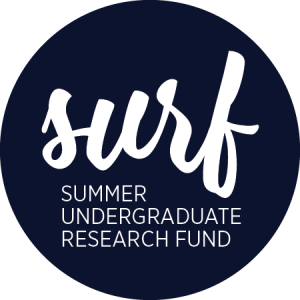

 Maggie Chafouleas ’22 (CAHNR) – UConn IDEA Grant recipient
Maggie Chafouleas ’22 (CAHNR) – UConn IDEA Grant recipient